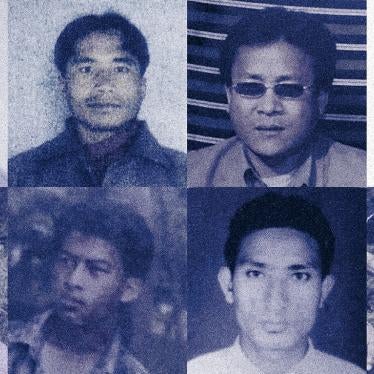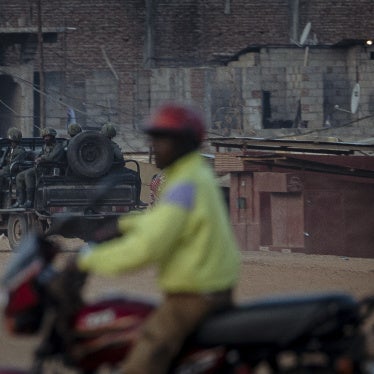The Cambodian government should urge the Senate to strike a provision of the draft Law on Prisons that would permit prison labor to be used for producing goods for private firms, Human Rights Watch said today. The draft law, which was passed by the lower house of the National Assembly on November 7, 2011, is expected to be sent to the Senate soon.
Permitting prison labor to work for industry would violate Cambodia’s obligations under International Labor Organization (ILO) conventions against forced labor and put Cambodia’s trade partners at risk of importing garments and footwear unlawfully produced by prisoners, Human Rights Watch said.
“Allowing private companies to profit from prison labor is a scandalous policy that will wipe out Cambodia’s long sought reputation as a country where cleaner production and better factories are possible,” said Phil Robertson, deputy Asia director at Human Rights Watch. “Cambodia’s trading partners need to make their voices heard at the highest levels in Phnom Penh and stop this travesty in its tracks.”
Article 71 of the draft Law on Prisons states: “Following the agreement from the Ministry of Interior, the General Director is entitled to enter into a contract to allow prisoners to work for any organization or individual for the purposes of prison industry and farming, and the General Director may enter into a contract to sell the products from prison industry, handicraft and farming.”
Investigations conducted by the media and civil society groups since 2009 have found the persistent production of goods in Cambodia’s prisons for export, despite pronouncements against the practice by Commerce Minister Cham Prasidh, for which he blamed “some unregistered sub-contractors.” More recently, the media reported that footwear was being produced in Sihanoukville prison and then exported. Production of garments for export has also been seen in Correctional Center 1 in Phnom Penh, and provincial prisons in Kandal, Takeo, and Battambang.
International legal standards place important constraints on how prison labor may be used, Human Rights Watch said. Under the United Nations Standard Minimum Rules for the Treatment of Prisoners, adopted by the UN as guidance, prison labor must be of a vocational nature, not as punishment, and prisoners should be allowed to choose the type of work they wish to perform. The work must not be driven by financial profit motives, and no prisoner should be forced to work for private entities.
ILO Convention No. 29 on Forced Labor, which Cambodia has ratified, states that only convicts can be compelled to work in prison; that such work must at all times be supervised by a public authority; and that prisoners may not be “hired to or placed at the disposal of private individuals, companies or associations,” which means that prison labor for private entities may be only by consent of the prisoner.
“It’s frankly stunning that Cambodia, which is so dependent on exports of goods produced in labor-intensive sectors like garments and footwear, would consider crossing the red line into prohibited trade practices like using prison labor,“ Robertson said. “Through either ignorance or greed, Cambodia’s policymakers are shooting themselves in the foot. If the government doesn’t step in, it will be up to Cambodia’s trade partners to act.”








